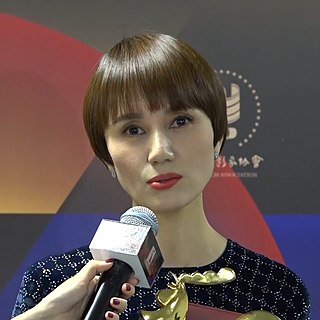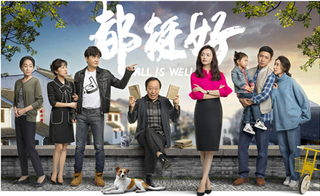Related Research Articles

Jiangsu is an eastern coastal province of the People's Republic of China. It is one of the leading provinces in finance, education, technology, and tourism, with its capital in Nanjing. Jiangsu is the third smallest, but the fifth most populous and the most densely populated of the 23 provinces of the People's Republic of China. Jiangsu has the highest GDP per capita and second-highest GDP of Chinese provinces, after Guangdong. Jiangsu borders Shandong in the north, Anhui to the west, and Zhejiang and Shanghai to the south. Jiangsu has a coastline of over 1,000 kilometers (620 mi) along the Yellow Sea, and the Yangtze River passes through the southern part of the province.

Suzhou, alternately romanized as Soochow, is a major city in southern Jiangsu province, East China. Suzhou is the most populous city in Jiangsu, and a major economic center and focal point of trade and commerce.
The Lu Xun Literary Prize 鲁迅文学奖 is a literary prize awarded by China Writers Association. It is one of China's top four literary prizes and is named after Lu Xun and has been awarded every three years since 1995. Its predecessor, the National Outstanding Short Story Award and National Outstanding Novella Award, was established since the beginning of the new-era literature in the early 1980s.
Wang Anyi is a Chinese writer, vice-chair of the China Writers Association since 2006, and professor in Chinese Literature at Fudan University since 2004.
Zhang Xinxin is a Chinese writer and director. Outside of China, she is best known for her work Chinese Lives (1986), co-authored with the journalist and oral historian Sang Ye. She has also written short stories, screenplays, and autobiographical works.
Ling Zhang is a former senior audiologist and fiction writer in Toronto, Canada. She was born in Wenzhou, China and came to Canada in 1986 to pursue her MA in English at University of Calgary. She obtained her second MA degree in Communication disorders at the University of Cincinnati. She has published nine novels and several collections of novellas and short stories in Chinese. One of her novels,《金山》, has been translated into English, French, and German. She has won numerous important literary prizes in China.

Yuan Quan, also known as Yolanda Yuan, is a Chinese actress and singer. She graduated from the Central Academy of Drama where she majored in drama.

Soochow University is a provincial public university in Suzhou, Jiangsu, China. It is affiliated with the Province of Jiangsu, and co-sponsored by the SASTIND and the provincial government. The university is part of Project 211 and the Double First Class University Plan.
Lu Wenfu(Chinese: 陆文夫, March 23, 1927 - July 9, 2005) was a contemporary Chinese writer. He was interested in literature from an early age and devoted all his life to it. He worked for many years as journalist and a magazine editor and served as president of the Jiangsu Writers' Association and vice president of the Chinese Writers' Association. Lu's life ended in Suzhou, his favorite city in Jiangsu province. All his work is a mirror of this old city and that's why his novels are generally regarded as Suzhou literature. He is famous for his first story Deep within a Lane (小巷深处). From then on, Lu started producing a lot of fictions and essays.

China Writers Association or Chinese Writers Association is a subordinate people's organization of the China Federation of Literary and Art Circles (CFLAC). Founded in July 1949, the organization was initially named the China National Literature Workers Association. In September 1953, it was renamed the China Writers Association. The association's leadership was purged shortly after the 1989 Tiananmen Square protests and massacre. In April 2012, the organization changed its translated name to China Writers Association.

Yilin Zhong is a British Chinese journalist, screenwriter and an author. She is the author of seventeen novels, two film screenplays, ten books and many other work including poems and literary reviews. She now lives in London.
Post 70s Generation is a literary critical term in Chinese contemporary literature, which refers to the new generation of writers who were born after 1970 in China. In some criticism these writers have also been described as the 'Post Cultural Revolution Generation', or 'Post Maoism Generation' as they grew up after Mao's death.
The Shanghai–Chongqing–Chengdu high-speed railway is a high-speed rail line under construction in China. The Chinese name of the railway line, Huyurong, is a combination of the abbreviations for Shanghai, Chongqing, and Chengdu. It will run in an east-west direction largely parallel to the Yangtze River, connecting the cities of Shanghai, Nanjing, Hefei, Wuhan, Chongqing and Chengdu.
Cheng Xiaoqing was a Chinese detective fiction writer and foreign detective fiction translator. He is known for his Huo Sang series, in which the main character, Huo Sang, is considered to be "the Eastern Sherlock Holmes".

All Is Well is a Chinese television series that premiered on Zhejiang Television and Jiangsu Television on March 1, 2019. The series is directed by Jian Chuanhe, and stars Yao Chen, Ni Dahong, Guo Jingfei, Li Nian, Tony Yang, Gao Xin, and Gao Lu. It is an adaptation of Ah Nai's novel, which shares the same title as the show. The series depicts the conflicts and struggles of a white-collar worker and her family members.
Priest (pseudonym) is a Chinese author whose works are published online. She has been actively writing since 2007 and has received several awards for her writing. She is signed by the web-based publisher Jinjiang Literature City. She is considered to be among the top five Chinese writers catering to women's interests. She is known for writing various genres of danmei, as well as novels featuring female protagonists. Her works have been adapted into manhua, donghua, and Chinese dramas. Many of her novels have been translated into Korean, Thai, Vietnamese, Traditional Chinese, and Japanese versions. The dramas Guardian, Legend of Fei, Word of Honor, and Justice in the Dark are based on Priest's novels.
Fan Hongwei is a Chinese entrepreneur and billionaire who is the chair and CEO of the chemical fiber company Hengli Petrochemical (恒力石化) and vice chair of its holding company Hengli Group (恒力集团). She was the fourth richest woman in China in 2019.
Li Mengwen is a Chinese professional footballer who plays as a right-back for Women's Super League club Brighton & Hove Albion and the China national team.

The Bond is a 2021 Chinese drama television series based on Wei Xi's novel of the same name, directed by Zhang Kaizhou and starring Bai Yu, Zhang Wanyi, Mao Xiaotong, Song Zu'er and Zhou Yiran. The series airs on Zhejiang TV, Jiangsu TV and Tencent Video from August 17 to September 8, 2021. The series received mainly positive reviews, Douban gave the drama 7.7 out of 10.

Zhang Yunhe was a Chinese writer and scholar of kunqu opera. She was the wife of linguist Zhou Youguang.
References
- 1 2 3 4 Contemporary Chinese Women Writers III (1st ed.). Beijing, China: Chinese Literature Press. 1993. ISBN 0-8351-3128-9. OCLC 30683782.
- 1 2 3 Abrahamsen, Eric. "Fan Xiaoqing". Paper Republic. Retrieved 2020-10-07.
- 1 2 "Fan Xiaoqing". China.org.cn. 2013-08-29. Retrieved 2020-10-07.
- 1 2 3 "女同志(范小青)_中国网". China Internet Information Center (in Chinese). 2008-10-28. Retrieved 2020-10-07.
- ↑ "江苏省作家协会历届主席团_江苏作家网". Jiangsu Writers Association (in Chinese). 2013-05-22. Retrieved 2020-10-07.
- 1 2 "Voices from two sessions on keeping traditional Chinese culture alive". China Daily. 2017-03-03. Retrieved 2020-10-07.
- ↑ "《女同志》_中国作家网". China Writers Association. Retrieved 2020-10-07.
- ↑ Six contemporary Chinese women writers IV. Chinese Literature Press. (1st ed.). Beijing, China: Chinese Literature Press. 1995. ISBN 7-5071-0297-1. OCLC 35966415.
{{cite book}}: CS1 maint: others (link) - ↑ Contemporary Chinese women writers VII (1st ed.). Beijing: Chinese Literature Press. 1998. ISBN 7-5071-0437-0. OCLC 43255556.
- ↑ Parris-Huang, Petula (September 2010). "Barefoot Doctor Wan Quanhe, by Fan Xiaoqing". Paper Republic. Retrieved 2020-10-07.
- ↑ The Temporal Townsfolks: Fan Xiaoqing and Her Soochow Writing by Gu Qingyu "Archived copy". Archived from the original on 2012-07-07. Retrieved 2020-10-07.
- ↑ Zicheng, Hong. (2007). A History of Contemporary Chinese Literature. Day, Michael M. Leiden: BRILL. ISBN 978-90-474-2214-3. OCLC 536021186.
- ↑ Ying, Li-hua (April 2010). The A to Z of modern Chinese literature. Lanham. ISBN 978-1-4617-3187-0. OCLC 829236597.
{{cite book}}: CS1 maint: location missing publisher (link) - ↑ "第四届鲁迅文学奖(2004—2006)_中国作家网". China Writers Association (in Chinese). 2007-12-03. Retrieved 2020-10-07.